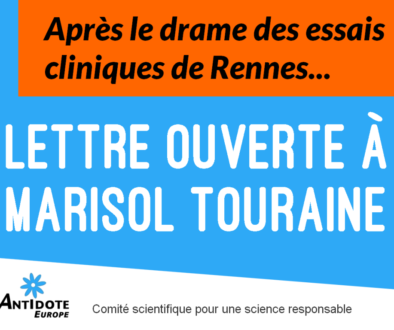Patients are now the real guinea pigs
Antidote Europe welcomes recent French media reports warning the public about dangerous medicines.
Antidote Europe welcomes recent media reports warning the public about dangerous medicines (the latest are the drugs mediator and buflomedil). The French-based NGOfully endorses this latest expose that reveals the enormous gulf between reliable scientific methods and some of the currently used tests, which are hopelessly out of date.
All medical drugs are required to undergo extensive animal testing, even though animals cannot reliably predict what will happen in a human. This message was clearly brought home by the near fatal Northwick Park clinical trial involving six young men who received an experimental drug at one five-hundredth the dose found safe in monkeys. While cases like this are relatively rare, the rate of adverse drug reactions in the general population is far greater. In fact, nine out of ten drugs that pass animal tests fail to make it through clinical trials involving people (1). This begs the question of why our regulatory authorities still require animal tests. Rather than protecting the public it seems thatanimal tests actually allow many toxic products to slip through the safety net and reach the market. As a result, about 20,000 people die of adverse drug reactions in France every year (2), making adverse drug reactions the fourth leading cause of death.
The regulatory authorities must bear the major responsibility for the current situation, at a time when modern scientific methods are available, including such techniques as toxicogenomics and human DNA studies — see https://antidote-europe.eu/campaigns/28-chemicals The u.se of such techniques could prevent further drug tragedies. The use of human DNA brings us ever closer to the application of “personalised medicine”, where drugs are tailor-made to suit the individual, thus reducing the risk of an adverse reaction. When it comes to the safety testing of drugs and other chemicals, people clearly are not 70kg rats.
(1) Lester Crawford deputy commissioner FDA, quoted in The Scientist (6.8.2004) “Innovation or Stagnation, Challenge and Opportunity on the Critical Path to new Medical Products”.
(2) Le Monde, 13 November 1997, quote by Bernard Kouchner, secretary of state for health.
CONTACT
André Ménache
Mob: (0790) 644-6889
Claude Reiss
akhan
Tel: (0)4 76 36 35 87


